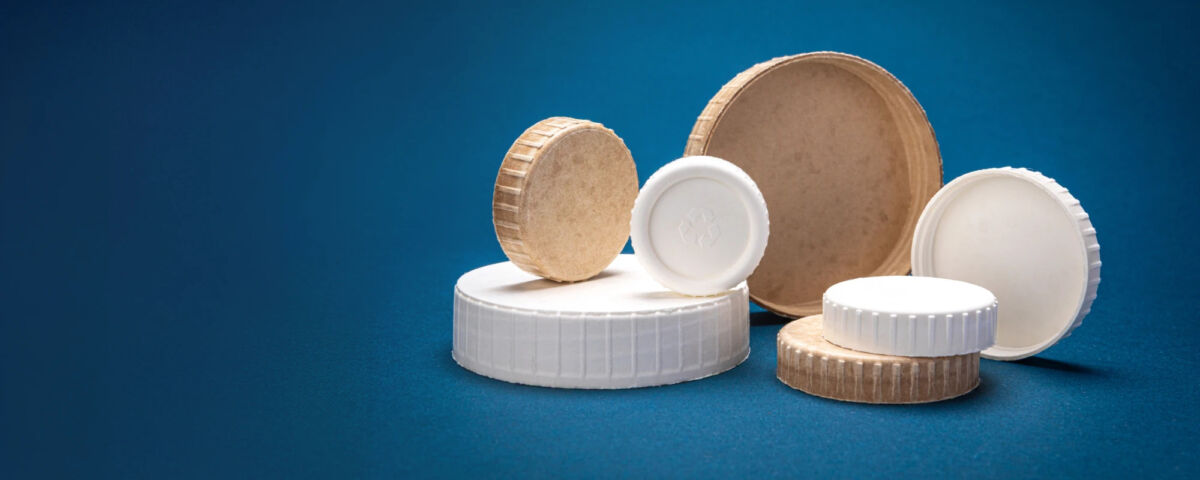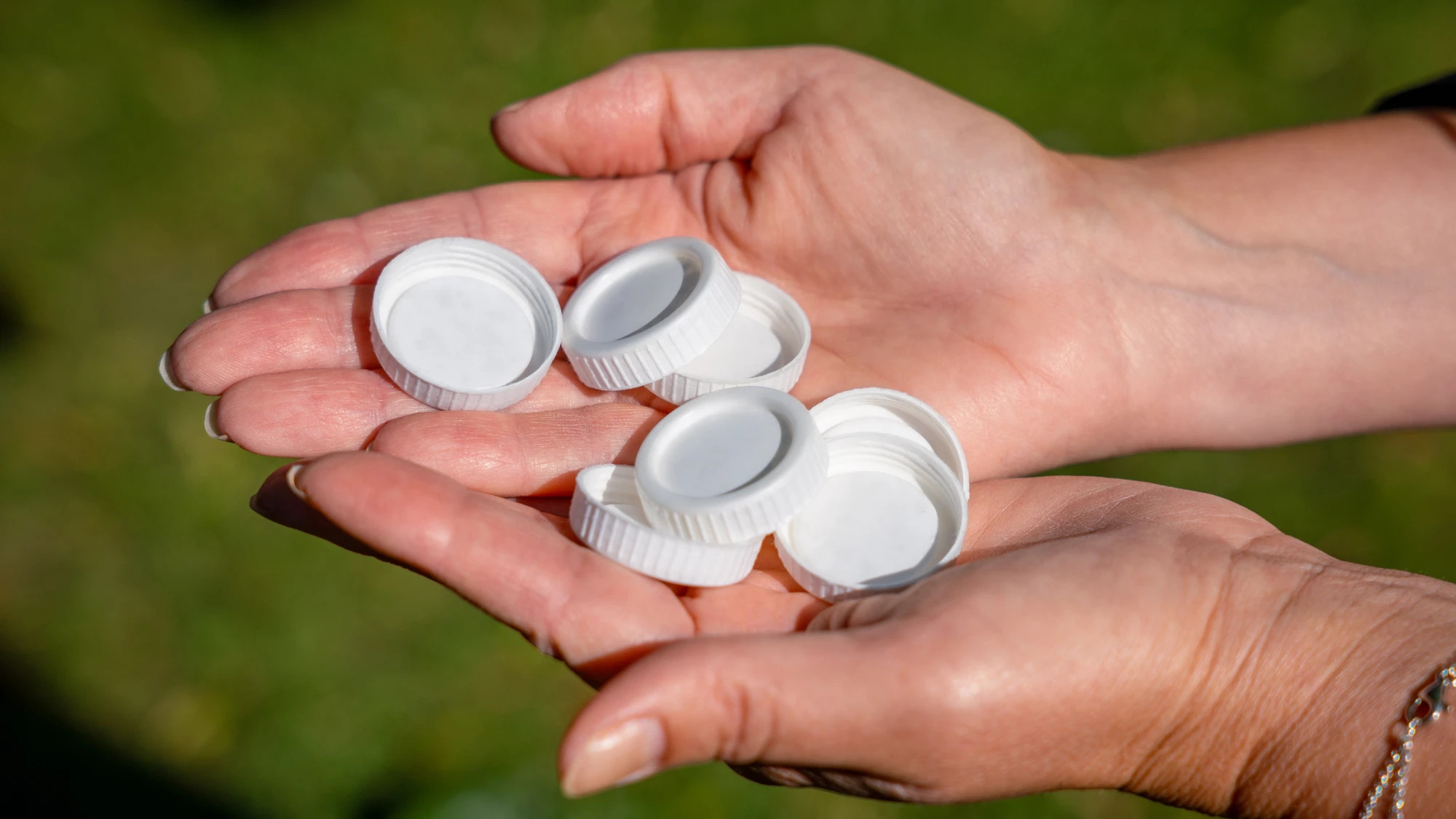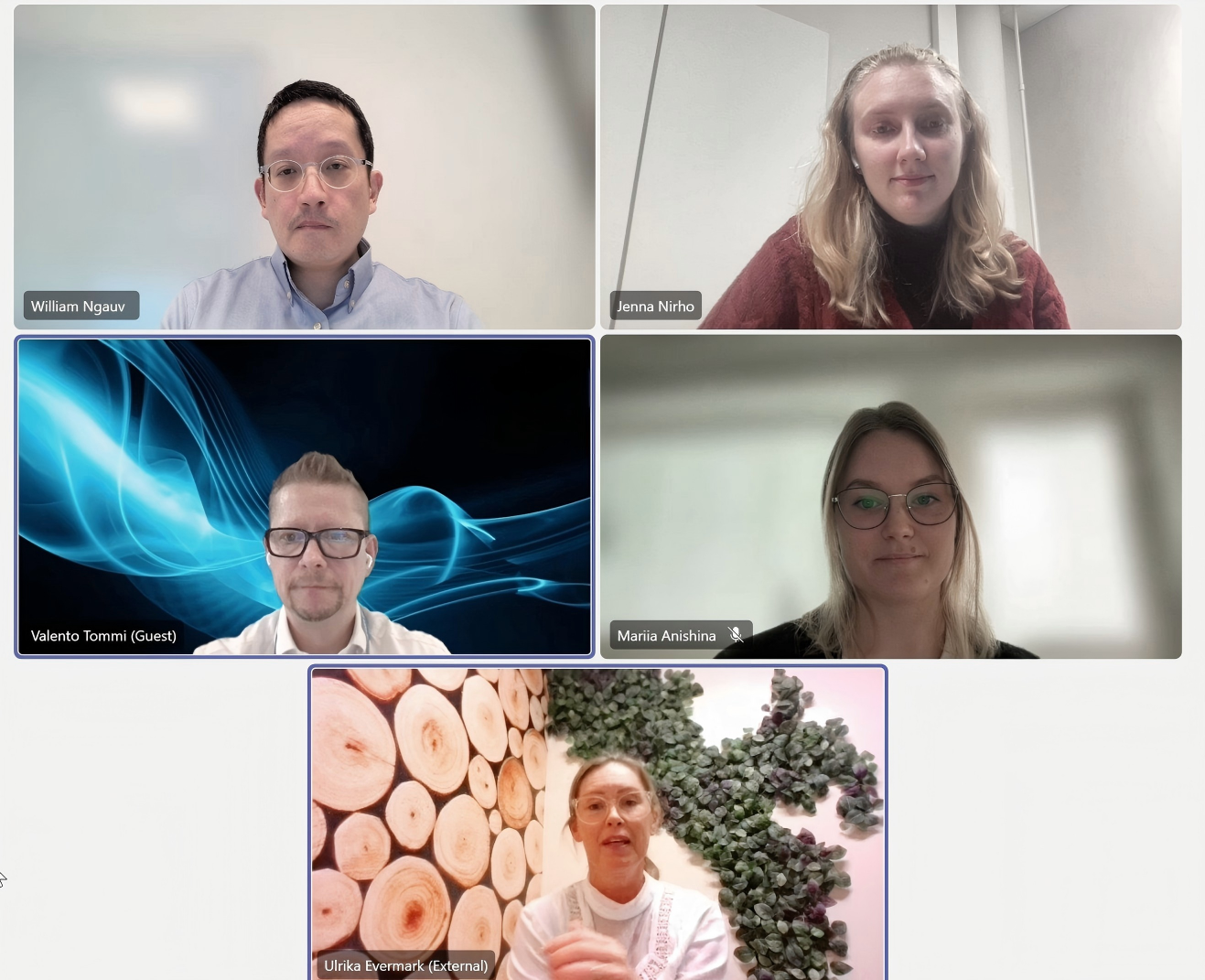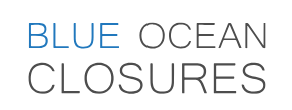




Keep this story going! Share below!
Blue Ocean’s innovation is a dry-forming, vacuum press technology that compacts cellulose fiber into rigid, durable caps and lids compatible with existing production lines. These fiber-based closures are recyclable as paper, biodegradable, sourced from certified forests, and reduce plastic use and carbon emissions. Therefore, this innovation is addressing several Sustainable Development Goals: 12 - Responsible consumption and production, 13 - Climate action, 14 - Life below water, and 15 - Life on land.
While much of consumer packaging has become recyclable, plastic caps and closures have remained without proper replacement until now. The innovation that Blue Ocean Closures (“BOC” has brought to the market is leading the way in replacing traditional plastic caps with fiber-based, biodegradable alternatives. These closures are made primarily from recyclable paper, with a minimal protective barrier, and offer the same strength and functionality as plastic, while significantly reducing environmental impact. The developed closure is at least 95% certified fiber-based and hence recyclable as paper. The closures are also designed to work with, for example, existing bottles, milk cartons, tubes, and jars, as well as with the existing production lines, making adoption easy for the brands.
Great Earth (a Swedish nutrient company and long-time partner of BOC) came to market with its magnesium supplement in April 2024, which is the first product in the market with a fiber-based closure. Subsequently, Great Earth decided in September 2025 to shift its entire product range to BOC’s fiber-based closures. BOC has also partnered with Absolute Vodka in June 2022 to develop a paper-based closure that can be used in vodka bottles, and in June 2025, Absolut Vodka launched an all-paper bottle accompanied by BOC’s closure. Other partnerships include Coca-Cola, Arla, and L’Oreal.
The caps are manufactured using a dry-forming technology, which in itself uses very little energy and requires no water at all in the production process. So not only is the production process low in energy, but the product itself also doesn’t contribute to microplastic pollution and has a high degree of biodegradability. Additionally, the fiber-based closures can be recycled as paper, which is its main advantage, and used as raw material for new fiber-based products. And even if incinerated, it only releases biogenic CO₂, making it a far more sustainable solution throughout its entire lifecycle and supporting true circularity.
This innovation directly supports multiple UN Sustainable Development Goals, including SDG 12 (Responsible Consumption and Production), SDG 13 (Climate Action), SDG 14 (Life Below Water), and SDG 15 (Life on Land), by reducing plastic pollution at the source. At its core, the product is very simple, but the innovation behind it is completely new, complex, and very exciting.

The fiber-based cap
The idea started when the CEO of Blue Ocean Closures Lars Sandberg was working as an innovation manager at BillerudKorsnäs. At the time, he was working as a technical project manager on a project to produce a paper bottle. He then came up with the idea of paper-based closure and went on to establish Blue Ocean Closures in November 2021.
“It's about reducing plastics and reducing carbon dioxide footprint from packaging” says Ms. Ulrika Evermark, Chief Communication & Relations Officer at BOC, and continues: “Closures - there have been plenty of studies on them - and they are among the most disposed of items in nature and that it's really ending up in our oceans and taking like 450 years before they degrade and causing microplastics, causing carbon dioxide emissions, causing plastics in our body”.
She continued: “We certainly see that this technology can be used in so many different ways and perhaps not only for closures, but also for other types of things. If you look around you, there are plastics in absolutely everything. There's so many plastic products out there that we think that we have discovered a way to substantially reduce with this technology. So, there will be more in the future”.
“These long-term partners […] have really been the key to why we are where we are. [They are] pushing us forward, asking, “Would this be possible? [..] [Our first application] came out in 2024, and since then, the brand during this pilot has, of course, done several studies together with their customers, and the feedback that they've got is amazing. They are literally saying that, you know, 9 out of 10 consumers prefer this fiber-based lid from a very many different aspects”, she sums up the customer experience from the fiber-based closures.
The fiber-based closure has the ability to replace plastic as the closure of choice in all applications found at home, ranging from foodstuffs to medicine and cosmetics. So far, non-plastic closure has been the missing packaging element; even milk and juice cartons, otherwise totally made of fiber, have had plastic closures. All major producers of liquid cartons are trying to eliminate the plastic closure from their cartons. BOC has created a new product that is superior, but currently still more expensive than the traditional plastic closure. It can therefore be assumed that fiber-based closures will replace plastic closures first in higher value products such as pharmaceuticals, cosmetics, and branded goods such as Absolut and Coca-Cola (both are BOC’s partnerships), and the replacement will continue into lower value and margin products thereafter.
It is estimated that in North America alone, the annual production of plastic caps and closures was 384 billion units in 2024, and it is estimated to grow to 459 billion units by 2029. Globally, the numbers need to be several-folded. This indicates that the potential for reducing plastics production, usage, and the related pollution is enormously large. There is no reason why, over time, all of these plastic closures could not be replaced totally with fiber-based alternatives. The value of the North American market is estimated to be USD 14.6 billion and is estimated to grow to USD 16.9 billion in 2029. Based on an estimate of USD 2,000 per ton of plastic resin (e.g., polypropylene or polyethylene) used in closures, replacing the North American plastic closures could reduce the use of plastics astonishingly by approximately 7.3 million tons per year.
BOC has been established to turn the idea of a recyclable and biodegradable fiber-based closure into a viable product. BOC currently employs approximately 25 people, up from one in November 2021, in less than 4 years. BOC is still very much in the R&D phase and is not currently breaking even; breakeven is not expected in the near future.
Major milestones along the journey include investments and partnerships from well-known large industrial players such as ALPLA (plastic packaging, originally in December 2021), SACMI (leading suppliers of press forming and downstream equipment for plastic caps and closures, October 2022), Elopak (carton packaging, March 2025), and Nissha (conglomerate, January 2025). These partnerships have provided financial backing to develop a paper-based closure from the idea into a viable commercial product. Furthermore, SACMI has been essential in providing technical know-how for manufacturing fiber-based closures on an industrial scale, as well as the specifications required for them to replace plastic closures. The production process is fully scalable.
As a first mover, BOC is well-positioned to capitalize on market development, even as later entrants increase competition. The global plastic closures market is estimated at USD $40 billion, and replacing them with fiber closures would mean the fiber-based closures market would be at least as large. If BOC were able to achieve and maintain even a 20% market share of that market, it would imply revenues in excess of USD 8 billion over the long term, making it one of the top 15 largest companies in Sweden.
Plastic closures are among the most difficult parts of packaging to recycle, as many are made from mixed materials that need to be separated to be recycled efficiently, and closures are too small to be effectively sorted, meaning they often bypass recycling systems entirely. Even when collected, most plastic caps are ultimately incinerated, contributing to fossil-based CO₂ emissions, or worse, they end up polluting natural ecosystems and breaking down into microplastics.
Fiber-based closures offer a different solution, as, unlike plastic, they can be recycled in existing paper streams, which have higher recovery rates in most countries. They are also highly biodegradable and do not contribute to microplastic pollution. And if incinerated, they release only biogenic CO₂, making them a much lower-impact option throughout their entire lifecycle.
This matters not just environmentally, but economically and socially. The global market for closures is enormous, and replacing even a portion of these with a renewable, recyclable alternative could eliminate millions of tonnes of plastic annually. This shift supports key climate and sustainability goals, eases the burden on waste infrastructure, and reduces the risk of long-term environmental harm.
By making it easy for brands to adopt cleaner materials without changing their production lines, this innovation accelerates the transition to a circular packaging economy, benefiting both people and the planet.
Get stories of positive business innovations from around the world delivered right to your inbox.
Ulrika Evermark, Chief Communication & Relations Officer


Blue Ocean Closures is a Swedish start-up established in 2021. It develops fiber-based screw caps and lids made from cellulose. The product is designed to replace traditional plastic closures and reduce overall plastic waste around the world. Their target group is consumer goods brands across sectors like food, beverage, nutraceuticals, and cosmetics that want to reduce their plastic footprint without compromising production efficiency.